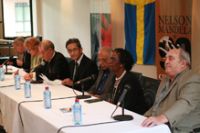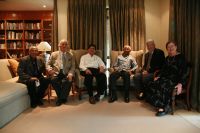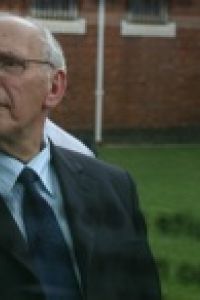March 14, 2008 – Three of Nelson Mandela’s co-trialists in the Defiance, Treason and Rivonia Trials in the 1950s and 1960s shared their memories of standing trial in South Africa for fighting against apartheid this afternoon.
Their memories were supplemented by recollections from Swedish activists who supported them morally and financially, in a dialogue at the Nelson Mandela Foundation in Johannesburg entitled “The Sweden and the South African Liberation Struggle ‒ Legal Aid in Perspective”.
The panellists were Bertha Gxowa (Treason Trial), Denis Goldberg (Rivonia Trial), Ahmed Kathrada (Defiance, Treason and Rivonia Trial), Swedish anti-apartheid activist Per Wästberg, Swedish diplomat Birgitta Karlström Dorph and Swedish attorney Christian Åhlund.
Bertha Gxowa amused the audience of invited guests by recalling an incident in which Helen Joseph, a defence witness, refused to divulge her age in her testimony.
“I remember Helen got on the dock and listed her accomplishments, the prosecutor then asked her, ‘You say you have done all this, a social worker, and a welfare officer, may I just ask, how old are you?’ and Helen refused to answer. She said, ‘What does my age have to do with this trial?’ She refused to answer until the court had to adjourn and the accused were asking her to just reveal her age. She said, “This case can go on for 10 more years, I will not reveal my age,’” Gxowa laughed.

The panellists (from right): Denis Golderg, Bertha Gxowa, Ahmed Kathrada, Chairperson Achmat Dangor, Per Wästberg, Birgitta Karlstrom Dorph and Christian Ahlund.
(Image: Nelson Mandela Foundation)Panellist Denis Goldberg, former Rivonia Trialist who spent 22 years in prison after being convicted at the trial, expressed great pride in being part of the dialogue.
“I am sitting with the giants of all the elements of our political struggle, the veterans,” he said. He continued to pay tribute to those who were already dead who had contributed a great deal to the struggle such as Treason and Rivonia Trials defence attorney, Bram Fischer. He thanked the enormous support from the Swedish government. He fondly recalled the manner in which the accused entered their pleas in the Rivonia Trial.
“When Walter Sisulu and Nelson Mandela stood up and said ‘I am not guilty, it is the government that should be charged,’ the judge demanded that everyone answer ‘guilty’ or ‘not guilty’. When my turn came, I stood up and said, ‘I associate myself with the sentiments of my colleagues’ and the judge smiled slightly,” Goldberg recalled.
Goldberg told of how, when the accused came into the court, they would greet the public with the “Amandla” sign, a fist raised high above the head, but soon the judge put a stop to it. To circumvent this, Goldberg would trace fist in his notebook, and raise the notebook to the courtroom. The notebook was then confiscated, he noted.
Ahmed Kathrada, the only surviving person, apart from Mr Mandela, who was an accused at The Defiance, Treason and Rivonia Trials, thanked the lawyers who represented them tirelessly during those times, and the women who cooked the trialists’ food.
He remembered a time during the Treason Trial when the state called someone who was meant to be a “star witness”. On this particular day, the court was packed with police, who had started being bored with the long trial and had generally stopped attending. The accused were not aware of this “star witness”, who turned out to be a man who claimed to been secretary of the ANC in the Eastern Cape, and to have led a march in New Brighton, Port Elizabeth. None of the trialists had ever heard of him, and upon cross-examination, it was revealed that at the time that he claimed to have been leading the march, he had in fact been in jail.
Kathrada also recounted how Helen Joseph had smuggled batteries hidden in her hair bun into prison for a forbidden radio.

Mr Nelson Mandela and his lawyers – George Bizos, with his son, Alexi, and Arthur Chaskalson and his wife, Lorraine
(Image: Nelson Mandela Foundation)Per Wästberg spoke about the many ways the Swedish people and government had supported the anti-apartheid government, not least financially. Government funds and money raised from individuals was channelled to South Africa primarily through the International Defence and Aid Fund (IDAF), which was outlawed by the apartheid regime.
IDAF had sent about R1-billion to support the struggle, said Wästberg, half of it from Swedish sources . Because it was done in secret, there were no audited records. “I had to guarantee personally that no money would go astray.”
Wästberg said that there were hundreds of lawyers who helped trialists in South Africa. “I must stress the courage of the lawyers at the other end,” he said. “Thanks to their ingenuity, the gallows were replaced by life imprisonment.”
Swedish diplomat Birgitta Karlström Dorph was posted in South Africa from 1982 to 1988. “My assignment was to extend support in the country to the resistance movement,” she said. She spoke of the difficulty of not knowing who the right people and organisations to trust were. “I used my ears, my eyes, all my senses, and my heart. She told the assembled trialists: “You were my teachers … It was your decisions that I relied on.”
She revealed that she didn’t ever handle any money personally, but that “Beyers Naudé was the cornerstone in the transfer of funds.” She said that though “We took risks, underlying it all … we share a common disposition, and values of human rights, peace and democracy.”
Karlström Dorph closed her speech by saying, “It was a school for life.”
Christian Åhlund spoke about the contribution lawyers made in the struggle, particularly in defending activists. “Good lawyers could and did make a difference,” said Åhlund, adding that this was not the case in other many other repressive regimes, in South America for example.
He also spoke of his personal role in ensuring financial support went to those who needed it most. “I was one of the lawyers who channelled money through law firms and client-lawyer privilege.”
Åhlund reflected on how the jurisprudence emanating from the post-democratic Constitutional Court in South Africa was widely influential. He looked to the future, saying, “Looking back at this great partnership between South Africa and Sweden … it’s inevitable that we ask ourselves if and how we can replicate this today?”
He said South Africa’s leadership in developing paralegals, for example, was important for other African countries such as Liberia, which had benefited from reviewing South Africa’s progress in this field. Åhlund added, “An increasingly important aspect of development work is to build the rule of law, especially in post-conflict countries.” This, he said, was another area in which lawyers from South Africa and from Scandanavia could work together.
After the panellists spoke, people in the audience were invited to ask questions and to reflect further on the inputs made.
A booklet on the dialogue will be produced by the Nelson Mandela Foundation in April 2008.
Reflections
Murphy Morobe
Murphy Morobe, former activist and chief executive officer of Kagiso Media said, “The dialogue is significant as it engages different generations of South Africa. It is important for recalling our history. It is also very important for younger people to understand where the country comes from, especially because these kinds of people and their contributions leave us with a legacy of what it means to be humble. And what it means to give of yourself for the betterment of society as a whole. I’m much younger, but I thought I want to be in the midst of it because there is something in it that I can still absorb.”
Anders Möllander
Anders Möllander, Swedish Ambassador to South Africa, said, “We got invigorated, the trialists got invigorated. There are very few people in Sweden who knew about the funding [provided to those fighting in the struggle against apartheid in South Africa] because of the secrecy that was required, and there few of the trialists who knew about it either. While the Swedish people did not support the Treason and Rivonia trials because they were too early, there is a clear link with later trials, when Sweden helped.”
Peter Nthite
Peter Nthite, a 1956 Treason trialist said, “I was very grateful to meet my old comrades today. Nothing could have been more exciting. I thought all features of today were successful, but the last bit [panel dialogue] was the most important. It was exciting to get insight into how hard people worked to negotiate our success.”
Achmat Dangor
Achmat Dangor, chief executive officer of the Nelson Mandela Foundation, said, “If you take people like this who have been through struggles we are only going to read about, you don’t find the same sense of despair than in the younger generation. I think the difference is patience – these people are used to persevering, while the succeeding generations are less patient.”
Verne Harris
Verne Harris, Head of the Memory Programme at Nelson Mandela Foundation, said, “I was surprised by the resilience of the veterans. They participated fully. There’s been fabulous camaraderie here, but what impressed me most about the dialogue is it wasn’t about self-congratulation – there was some serious reflection and self-criticism.”
Kesval “Kay” Moonsamy
Kesval “Kay” Moonsamy, a Treason trialist and member of ANC in Parliament, said, “It was an important gathering; it brought former prison trialists together and it was recalling the past. It was an interesting development in the transformation of our society. This gathering is also an inspiration to all freedom-loving and peace-loving South Africans. The Treason Trial was democracy on trial, it was the Freedom Charter on trial.”
Ayesha “Bibi” Dawood
Ayesha “Bibi” Dawood, a Treason trialist said, “I am very happy that we met again after so many years. I’ve met people I haven’t seen in 53 years.”
Max Sisulu
Max Sisulu, son of anti-apartheid icons, Walter and Albertina Sisulu, said, “I thought it was an opportunity to look back at the past and at the relationships between the Nordic people, the Swedes and us. The food and stuff they helped us with. They helped build schools; I had an opportunity to study in Sweden. It’s a good relationship and I hope it will continue to make South Africa what it is today, a truly democratic country.”
Paulos Tesfagiorgis
Paulos Tesfagiorgis, senior advisor to Democracy and Constitution Building Africa, said, “For me it’s moving, a bit emotional because I also come from a struggle background in Eritrea. I like the way they are just giving their testimony, with humanity and humility, and trying to put it within the present South African context. I also envy them because in other countries, we don’t see this kind of reflection going on, so it makes me emotional and envious.”
Motsamai Mpho
Motsamai Mpho, a Treason trialist, said, “For me, being on trial was good, because finally, the government would have to tell people what it was they perceived the ANC to be doing wrong. And finally, people would know what the ANC was doing and us as the trialists would finally get a chance to tell the country why we were doing what we were doing.”
Sibongile Mfaxa
Sibongile Mfaxa, daughter-in-law of Treason trialist Nzimeni Elliot Mfaxa, said, “As a civil servant, I was touched by Mr Goldberg saying that the civil servants were almost failing the country. That gave me and jolt and I am now energised to do better. I wish that they [veterans] could teach us how to be like them, to be passionate, peace-loving and as determined.”
Bertha Gxowa
Bertha Gxowa, a Treason trialist said, “This day meant so much to me, I wish we had thought of it long ago and done it more often. I haven’t seen some of these people in over 40 years and these are people, for a time, who were such a big a part of my life and my work. I think it is important that we know where we come from and to take time to reflect on those beginnings.”
Further information
The 1952 Defiance Campaign Trial:
Twenty activists including Nelson Mandela, Nthato Motlana and Ahmed Kathrada were arrested in August 1953 for their parts in the Defiance Campaign against unjust laws. They were charged under the Suppression of Communism Act. That December all 20 were convicted and sentenced to nine months in jail with hard labour, suspended for three years.
The 1956 Treason Trial:
The 156 men, women and a newspaper charged with high treason in December 1956 for their efforts to end apartheid, came from across racial and class spectrums in South Africa. In what became a marathon political trial, 65 had the charges against them withdrawn by January 1958; of the 91 who were indicted for trial in Pretoria, 61 were acquitted in April 1959 and the last group of 28, of which Mr Mandela was a part, were found not guilty on 29 March 1961.
The Rivonia Trial:
Mr Mandela and seven of his colleagues were jailed for life on 12 June 1964.
During the Rivonia Trial, Mr Mandela sat in the dock and said these now famous words: “During my lifetime I have dedicated myself to this struggle of the African people. I have fought against white domination, and I have fought against black domination. I have cherished the ideal of a democratic and free society in which all persons live together in harmony and with equal opportunities. It is an ideal which I hope to live for and to achieve. But if needs be, it is an ideal for which I am prepared to die.”
After Rivonia, there were scores of other political trials during which thousands suffered and were punished. Many of them and their families were supported by the assistance of anti-apartheid groups throughout the world. The Swedish anti-apartheid movement was one of the prominent groups to lend moral and financial support to activists and their families as South Africa’s struggle to deepened and financially triumphed.
Sweden & South Africa:
The Nelson Mandela Foundation thanks the Embassy of Sweden for its role in helping to bring together these surviving former trialists. Sweden’s support to anti apartheid movement started in the 1960s and grew over the next decades to involve a range of actors, from governmental and political parties to churches, student organisations, and trade unions. At the time of the 1994 democratic elections in South Africa, the Swedish government had disbursed some 2.5 billion Swedish kronor (in current figures, approximately $350 million) to the South African liberation struggle. The Swedish government was the ANC’s main donor in the non-military field.
